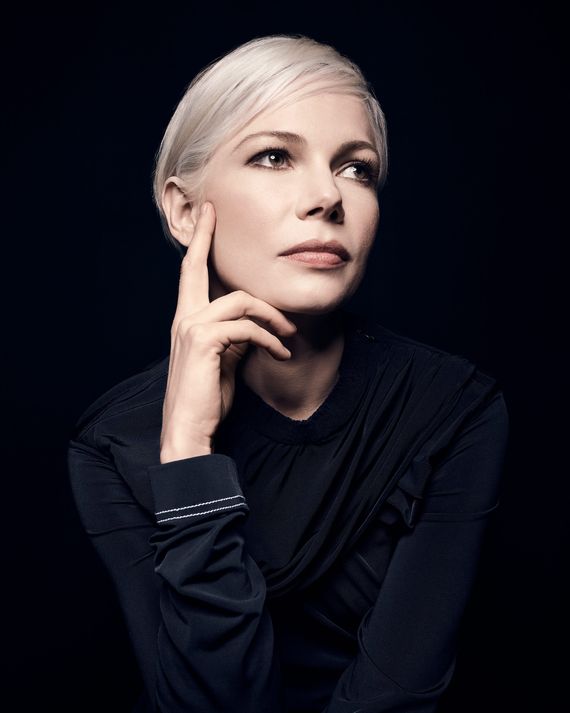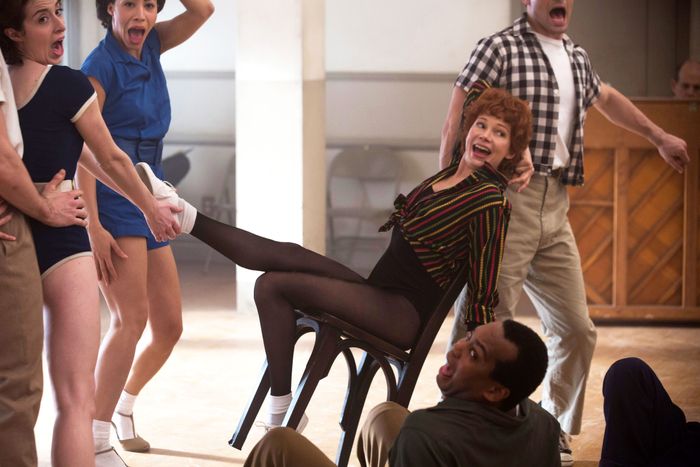
“I don’t know if I’ve ever been a meme before,” Michelle Williams says, laughing, when I mention the viral clip of her as the great Broadway dancer Gwen Verdon, dramatically wiping a tear off her face in the second episode of FX’s Fosse/Verdon. Her hand travels up her cheekbone, under her nose, back behind her head, and then back alongside her cheek, flicking behind her like a windshield wiper in the final beat as if to rid herself of Sam Rockwell’s Bob Fosse, the legendary choreographer and director, Verdon’s sometime husband and longer-time collaborator, who is trying to smooth over the fact that he has seduced Verdon while his wife is deathly ill. It’s a ridiculously outsize gesture that’s nevertheless fitting for a character whose whole life is theater. Williams didn’t imitate Verdon so much as light the stage lights within her. If Fosse is the person you know, Verdon is the one you’re watching.
But Williams hasn’t seen her own meme. She doesn’t watch any of her own work, though she agrees to let me show her a clip of someone mimicking it in tribute, provided I cover the part of the screen with her performance. She doesn’t quite remember why she moved her hand the way she did, other than that she and the director, Tommy Kail, had been talking about the way Verdon would prepare to play herself in public and in private. “It’s so much to play,” Williams says. “She would accentuate a sentence where a normal human being wouldn’t. How is she going to sit on that chair? How is she going to collapse? How is she going to wipe away a tear? She had a sense of who people wanted her to be, and she wanted to deliver.” And Williams delivered Verdon: She’s up for an Emmy for the role.
Unlike Verdon, Williams, in person, appears in no way theatrical. She arrives at the tourist-filled midtown hotel bar where we’re meeting with her trademark blonde bob, a white frontier-ish dress that resembles something anyone could be wearing in gentrified Brooklyn, her fingernails painted black. She speaks quietly, but with assurance, and closes her eyes to concentrate when she’s trying to phrase an answer just how she would like, which happens often. The way she talks about playing Verdon makes it sound as if she experienced a nine-month possession by a particularly extroverted ghost. “I want to be a tiny little ball as a person, and when I started researching this, I was like, Fuck, this is going to be good for me,” she says. “Her nature is so opposite of mine. And I’m going to have to expand myself as a human being in order to play her.”
Williams was familiar with a little of Verdon’s career going in, including her star turn in Damn Yankees, but not its full breadth — from shows like New Girl in Town and Can-Can through Sweet Charity and Chicago. Williams had some musical-theater experience from a Broadway stint in another Fosse show, Cabaret, but she went through rigorous dance rehearsals to learn Verdon’s steps and worked with a Juilliard dialect coach on Verdon’s peculiar mid-Atlantic accent. Before each scene, she would refer to a collection of clips of Verdon’s various press appearances, which she organized by date to make sure she captured the variations in her voice over time.
Fosse/Verdon was originally titled Fosse and based largely on Sam Wasson’s biography of the same name. But in talking to Fosse and Verdon’s daughter, Nicole, the show’s writers rethought its focus. The series treats Verdon and Fosse as creative partners, though in ways that weren’t traditionally given the same level of respect. Verdon didn’t think of herself as a choreographer or director, Williams tells me, but she had a talent for managing the mood on set, for explaining ideas that Fosse struggled to articulate, and for smoothing things over with the producers with whom he fought. “Somebody told me that she would get to the dance space early and set up the tables and chairs,” Williams says with awe and a little sadness. “Greatest dancer of her time and she’s setting up the tables and the chairs.”
Verdon started her career at a young age, mastering tap and ballet as a child before getting the opportunity to tour with Jack Cole’s dancers. Williams herself started acting as a teenager, with roles in things like Baywatch and Lassie, while emancipating herself from her family. “I know what it feels like to work in a way that you never really imagine you’re going to get access to the kinds of rooms or the kinds of doors that open for her,” she says. She remembers a legend that Jack Cole punched Verdon in the face when she told him she was leaving to work with Bob Fosse. “What did she do? She wiped the blood off of her nose and kept moving,” Williams says. “That kind of determination I think I relate to.”
Williams’s need to keep moving may have initially made her hesitant to do Fosse/Verdon. Sixteen years and four Oscar nominations since the end of Dawson’s Creek, in which she first became famous for playing the troubled and alluring Jen Lindley, Williams was still reluctant to return to television, even though the medium has blossomed creatively since then. “When I got out of television, it felt like a stain on you,” she says. “It was hard work to erase it and to ask to be looked at in a different new way.” People would tell her that TV had changed, but she knew the experience of being on a show like Dawson’s Creek, and she knew that meant having almost no control. “Scripts come at you and you have no say. You feel like an eternal child,” she says, noting that while grateful for the experience on that show, she didn’t want to return to that feeling. “I was afraid of putting myself in a position where I was going to commit to something and then eventually be asked to do something that I didn’t want to do.”
What made the offer to do Fosse/Verdon different: equal pay, which also meant a larger say. Williams was coming off the experience of reshooting All the Money in the World with Christopher Plummer after Kevin Spacey was replaced amid sexual-abuse allegations. She agreed to a small per diem for the additional shooting days, while her co-star Mark Wahlberg was paid $1.5 million. When the discrepancy became public, it put Williams at the center of a discussion about equal pay in Hollywood, and when FX made the offer for Fosse/Verdon, Williams was promised that she and Rockwell would have equal salaries.
“They gave me the support I needed, and for them that took the form of putting their money where their mouth is,” Williams says. That didn’t just mean money, but also the respect that comes with it. FX paid for the dance lessons she asked for, and opened the dance studios when she needed them, and even agreed to postpone production for a week when she and Rockwell insisted they needed more rehearsal. “People were treating me like I had value, and so then I felt valued, and I displayed my value,” she says.
Money, as Williams has been exploring recently, means more than just money. It’s a means, as she puts it, to buy “choice, freedom, peace, quiet, downtime.” Though she has built her career since Dawson’s Creek on smaller indie dramas, including a string of stark, gorgeous Kelly Reichardt movies set in the American Northwest, she also took a role in the superhero film Venom. She hasn’t given up on smaller films, recently appearing in After the Wedding with Julianne Moore, but having money has allowed her a few months’ off before Venom 2 to spend with her daughter, Matilda, whom she had with the late Heath Ledger.
“I used to really believe in work being a pure thing, but I don’t know how practical that is or how worldly that is,” she says. She begins to act out a sort of science-lab experiment with her hands, as if she is currently titrating her own career. “I started to feel like, Can I drop these other colors into the solution without polluting it? Can I retain how I think of myself while adding in these other qualities and concerns, such as a retirement fund?”
In Fosse/Verdon, we see Verdon make such accommodations all the time. Even after vocal-cord surgery, she stays in Chicago for the money, and she’s always planning out a future for her daughter. As Fosse immortalizes himself with All That Jazz, she operates in the background, accommodating, ameliorating, surviving.
Had Verdon lived today, would her contributions have gotten more respect? This is one of those questions that makes Williams close her eyes and concentrate. “I think so,” she says. “I thought the world was the world. I didn’t ever expect things to be fair. I didn’t expect this much out of life, being a woman. And in the last couple of years, that started to shift.”
Williams herself has contributed to that change. She has heard from people who told her they’re the Gwen Verdons of their own relationships. “To see her get the recognition that she deserved,” she says, “makes them think about how to ask for the recognition that they deserve.”
Recently, Matilda found a hat online that read #gwen, got inspired, and asked Williams to buy it for her. “Could there be anything cuter than your daughter wearing a hat with your character’s name on it?,” Williams says and smiles.
*A version of this article appears in the August 19, 2019, issue of New York Magazine. Subscribe Now!



